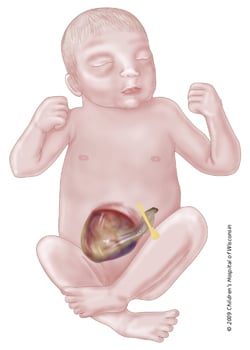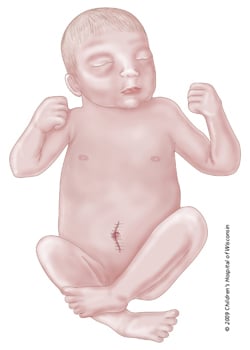After surgery, your baby may not be able to breathe effectively on their own due to the increased pressure on the diaphragm. Doctors will place a special tube (called an endotracheal tube or ETT) at the time of surgery (if it was not needed earlier) to assist with breathing. This tube goes through the vocal cords and into the windpipe. While the ETT is in place, your baby will not be able to make any noise because of the tube’s position in the vocal cords. This tube will stay in until your baby can breathe well on their own.
Doctors also will pass another tube into your baby's stomach (either through the nose or mouth). This tube will be suctioned to keep the stomach empty so as not to cause more pressure on the diaphragm.
Your baby will not be able to eat for a time after surgery. Some special lines are put in place while your baby is in the operating room for surgery. These lines include:
- A central line will provide nourishment (vitamins, minerals, protein, calories, fat) for a prolonged period of time.
- An arterial line will be placed in one of the extremities. We can monitor blood pressure and remove blood for lab work through this line.
- Before your baby goes to surgery, doctors will place a peripheral IV line. This IV line may be placed in the hand, arm, scalp, foot or lower leg.
There are some other things you can expect during and after surgery, including:
- Your baby will need frequent blood draws for lab work to monitor oxygenation, electrolytes, blood count as well as other things.
- Your baby may be on a variety of medications that can include antibiotics to fight infection and pain medication to control pain after surgery.
- Your baby may look puffy or swollen after surgery. The legs may be especially swollen. This is called edema. It will go away as your baby gets stronger and their body adjusts to the pressure of the bowels being back in the abdomen.
Because some babies with omphalocele cannot eat for a prolonged period of time, doctors will give special nourishment through the central line. Total parenteral nutrition is an IV solution that contains protein, fats, sugar, vitamins and minerals. This will supply your baby with all of their nutritional needs until they are able to take food by mouth.
One of the hardest parts of recovery for babies with omphalocele is learning to eat and tolerating food. Their bowels require time to adjust to being inside the body. We wait for signs from your baby that the bowels are beginning to work. These signs include:
- Bowel sounds
- Spontaneous passing of stool
- Decrease in the amount of drainage coming from the tube in your baby's stomach






